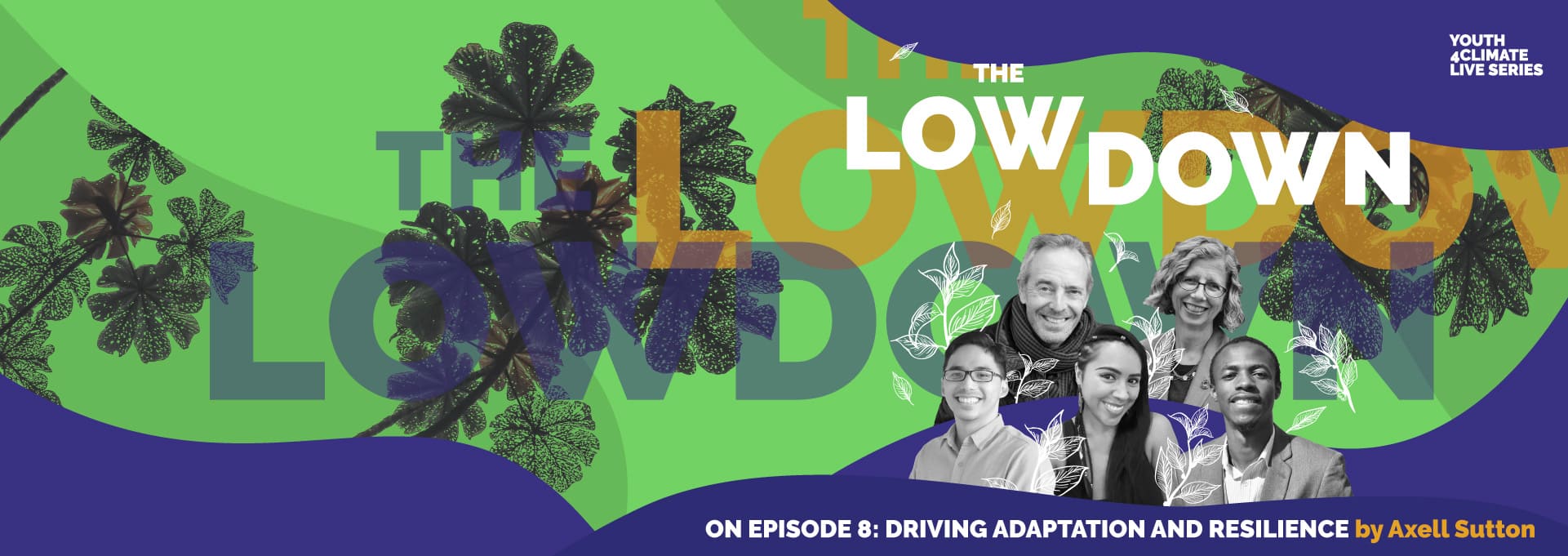
The eighth installment of the #Youth4ClimateLive series, which aired on January 22, 2021, provided a smorgasbord of calls to action and commitments to drive adaptation and resilience. Beginning with an informational video outlining the concept of adaptation from a variety of global perspectives, the webinar quickly delved into the nitty-gritty, inviting audience members to contemplate which aspects of adaptation + resilience they personally find most interesting.
Moderated by Ahmed Badr and Salina Abraham, the event allowed hundreds of young people from around the world to hear from both peers and seasoned experts on climate adaptation and pathways to resilience. The three young climate leaders on the panel shared the steps they’ve taken in their own countries to propel technology and innovation, collective climate activism, and accessible education for all.
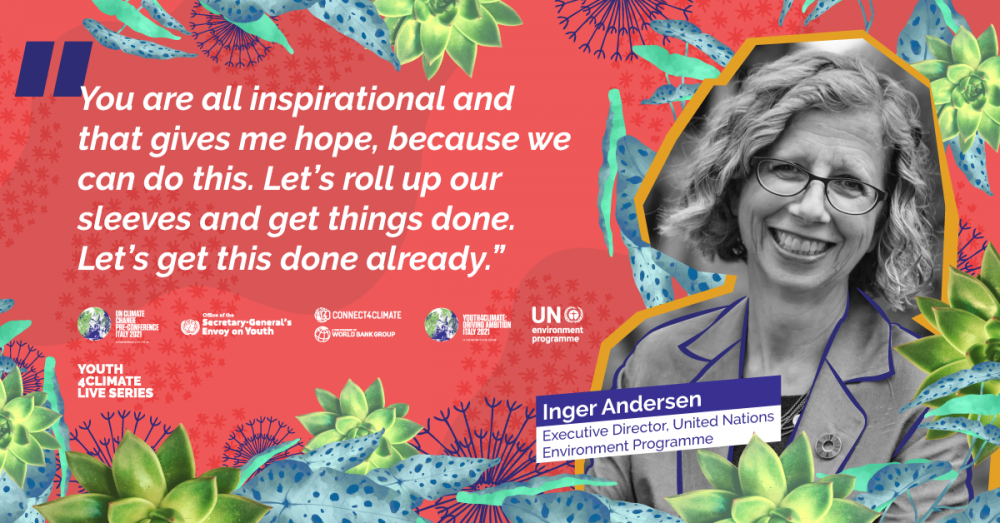
Planning is Not Enough
Inger Andersen, Executive Director of the United Nations Environment Programme, reminded us that our current climate ambition is unequal to the demands of the climate crisis. She emphasized the importance of incorporating the testimony and ideas of young people into the policymaking process to meet the fundamental goals of the Paris Agreement and effectively respond to the climate impacts we’re already witnessing.
“Young people can greatly influence political life, promoting the vote for climate agendas, helping to wake up those who still do not think about the consequences of our consumption,” she said. Working alongside educators and local organizations to harness nature-based solutions and build adaptation and resilience will be key as we move forward.
Andersen framed this discussion with the just-published 2020 Adaptation Gap Report, a valuable resource that shows how much ground nations around the world need to make up in their implementation of climate adaptation measures (with a particular focus on nature-based solutions). She said that while about half of the nations assessed at least have good intentions, there is a lot left to be done in terms of ensuring equity in financial support for adaptation and giving adaptation as much attention as mitigation. Pointing out that the G20 nations alone account for 78% of all global emissions, she reminded us that it is the duty of larger countries to bear the brunt of this collective effort to adapt and overcome.
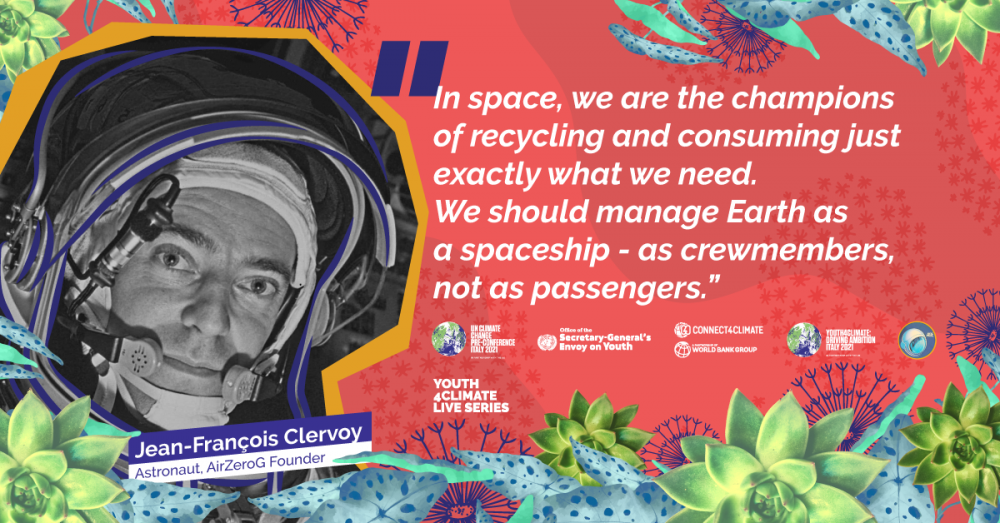
Earth Isn’t Fragile, Life on Earth Is
Jean-François Clervoy, an astronaut and the founder of AirZeroG, told us through his experiences how the fragility of life on Earth is not widely appreciated, noting that while the planet itself is unlikely to crumble anytime soon, the life that calls it home is in a very delicate position. Earth will survive thousands upon thousands of years no matter what we do: it is we, life, who are imperiled by the climate crisis, and it is up to us to reduce the risks.
“When you look at Earth from space, you really take ownership of this reality that Earth is finite, unique, and isolated,” Clervoy said. He recalled observing firsthand the light cloud of gas that protects us—our atmosphere—and marveling at its thinness. In that moment it became starkly clear that we humans are all alone in space, that our delicate atmosphere is all we have to shield us, and that it’s therefore our collective responsibility to manage our resources with care. “Earth is a spaceship,” he said. “The life support system is very fragile, and we should protect that system. We should take care of that system.”

Youth Driving Action
The #Youth4Climate guests shared their personal experiences observing and dealing with the effects of climate change around the world. Their hopeful stories were very inspiring, filling me with the resolve to act in the face of this crisis. All three agreed on the importance of creating safe spaces for young people where they can freely share and discuss the problems that concern them with those in positions of power.
The first to speak was Satrio Wicaksono, winner of the Space4Youth 2020 Competition, who, with the help of satellite technology, is saving his region from massive deforestation. His story demonstrated that innovative young people working in harmony with institutions can have a huge impact on the health of tropical forests and many other facets of the natural world. Wicaksono wants to demystify the world of climate science for others like him and welcome more #Youth4Climate leaders into the fold. Making climate data accessible and actionable to young people around the world is a key step towards a sustainable future.
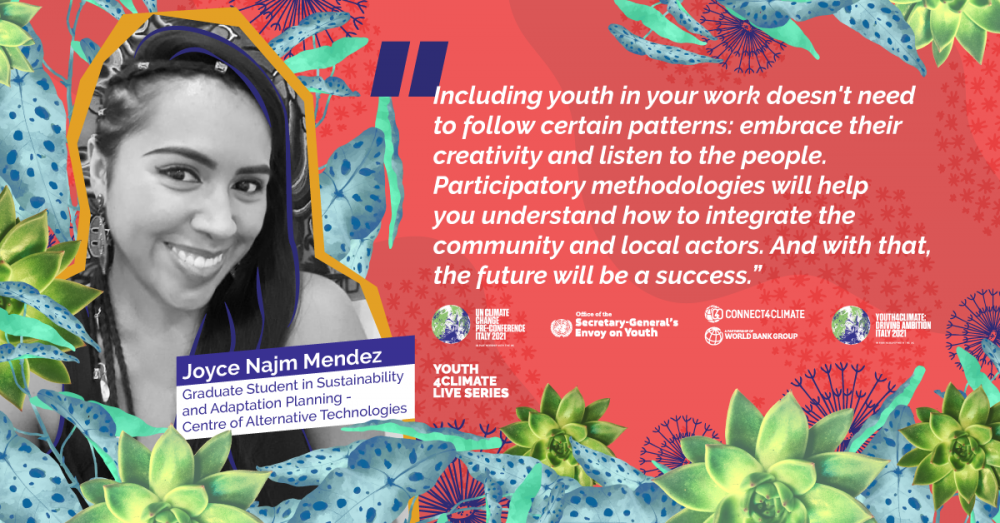
One phrase that left a real impression on me this episode came from Joyce Najm Mendez, a graduate student in Sustainability and Adaptation Planning. “Climate change has no borders,” she said—a strong statement that has so much to show us and so much to awaken in the hearts of youth activists. Stressing the power of young people to organize and shape policy at the municipal and national levels, Mendez spoke powerfully to the strength of intercultural collaboration, the need for capacity-building, the essential value of environmental education, and the importance of forming unified teams like the one she’s a part of. Everyday citizens can make a difference if they work across cultural lines in the pursuit of common good.
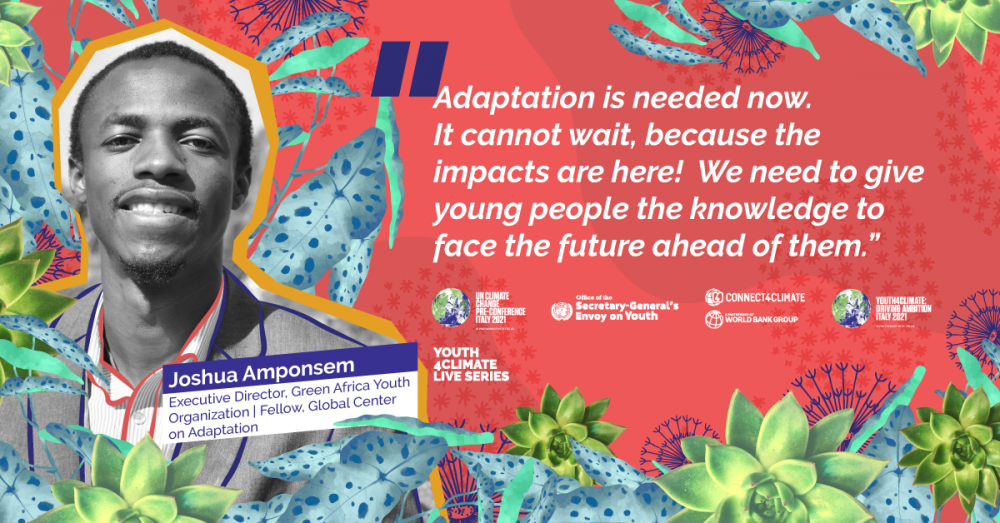
We young people are facing multiple challenges, but we must not lose our motivation. Joshua Amponsem, Executive Director of the Green Africa Youth Organization, illustrated this with powerful words about his family and the people of his hometown, who are constantly grappling with inequalities magnified by the climate crisis as they work together towards a better future. This story of perseverance and unity in the face of adversity greatly inspired me to continue my own work as an activist. Amponsem was adamant that young people can’t make change happen in a vacuum, though: we need a supportive education system and leaders willing to finance adaptation and resilience.
I came away from this episode realizing that young people need access to spaces in which we can truly transform reality; we won’t settle for meaningless “inclusion.” We need the baseline knowledge to come to terms with climate challenges as well as the confidence to overcome them with bold ideas, passion, and hard work.
Enjoy this edition of #TheLowdown? Drop Axell a follow on Twitter and Instagram!



